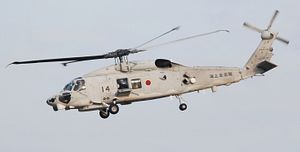A senior U.S. Navy officer, Admiral Robert Thomas, commander of the Seventh Fleet and the top U.S. navy officer in Asia, has told Reuters that the United States would welcome operations conducted by the Japanese Self-Defense Forces in the South China Sea. The comments are in line with broader U.S. support for Japan’s military playing a more global role.
The prospect of Japanese air patrols (and potentially other operations) in the hotly disputed South China Sea would ostensibly serve to counter China’s attempts to administer the air in the region. China and four Southeast Asian nations currently contest a variety of islands and shoals in the South China Sea. Beijing’s territorial claim is by fair the most capacious, including almost the entirety of the South China Sea under a historical dashed-line claim.
“I think allies, partners, and friends in the region will look to the Japanese more and more as a stabilizing function,” Admiral Thomas told Reuters. “In the South China Sea, frankly, the Chinese fishing fleet, the Chinese coastguard and the [navy] overmatch their neighbors,” he added. “I think that JSDF operations in the South China Sea makes sense in the future.”
Currently, Japan largely focuses its aerial and maritime patrol efforts in the East China Sea where it is currently embroiled in a bitter territorial dispute over the sovereignty of the Senkaku/Diaoyu Islands with China. Although tensions have largely subsided since fall 2014, Japan regularly scrambles jets against Chinese aerial and maritime incursions in the area. Japanese air patrols in the South China Sea would without question increase tensions between Japan and China. The Chinese government perceives a militarily resurgent Japan under Prime Minister Shinzo Abe and is skeptical of the current Japanese government’s intentions for Japan’s armed forces. Over the summer last year, Abe’s cabinet passed a resolution reinterpreting Article 9 of Japan’s post-World War II constitution to allow for its military to exercise the right to collective self-defense.
Admiral Thomas’ comments are in line with the ongoing U.S.-Japan bilateral defense guideline overhaul process. The two allies have generally had a lopsided relationship due to Japan’s constitutional restrictions regarding its military capabilities. Following last year’s resolution on collective self-defense, Japan and the United States are revising their defense guidelines to emphasize a more “global” role for the Japanese military. Japanese patrols in the South China Sea would also fit into the rubric of what Japanese Prime Minister Shinzo Abe has described as “proactive pacifism” — in essence, Abe wants to see Japanese power used for the preservation of the regional status quo. Aerial patrols in the South China Sea would be one way of doing so.
All this said, the prospect of Japanese air patrols in the South China Sea is likely unrealistic given the potential for destabilizing an already fragile region. What is more likely is that Japan will pursue closer security cooperation with Southeast Asian states with South China Sea claims including the Philippines and Vietnam. Recently, Philippine Defense Secretary Voltaire Gazmin and Japanese Defense Minister Gen Nakatani met in Tokyo. The two signed a memorandum on cooperation that will see Japan move toward participating in military exchanges with the Philippines armed forces, providing training, and transferring defense technology and equipment.

































